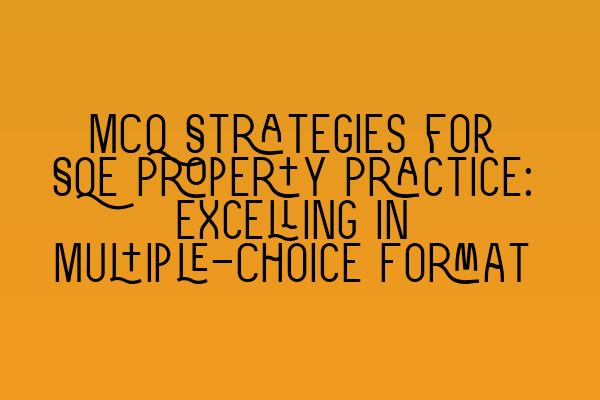MCQ Strategies for SQE Property Practice: Excelling in Multiple-Choice Format
As an aspiring property lawyer preparing for the Solicitors Qualifying Examination (SQE), you are likely familiar with the challenges posed by the multiple-choice format. The SQE property practice module requires a solid understanding of various legal principles and their practical application. In order to excel in this format, it is important to develop effective strategies for tackling multiple-choice questions (MCQs). In this blog post, we will discuss some valuable MCQ strategies specifically tailored to the SQE property practice module.
1. Understand the Structure and Content of the Exam
Before delving into specific strategies, it is essential to gain a thorough understanding of the structure and content of the SQE property practice exam. Familiarize yourself with the exam blueprint provided by the Solicitors Regulation Authority (SRA). This will give you valuable insights into the distribution of questions across different topics and the weighting of each topic. Understanding the exam structure will help you allocate your study time effectively and prioritize topics based on their importance.
2. Master the Fundamentals
A strong foundation in property law is crucial for success in the MCQ format. Begin your preparation by revisiting the core principles of property law, including the key statutes, landmark cases, and fundamental concepts. Ensure that you have a solid grasp of topics such as land registration, co-ownership, leases, mortgages, and easements. Understanding the basics will provide you with a framework for answering complex MCQs.
3. Develop a Systematic Approach
Approaching MCQs in a systematic manner is key to maximizing your chances of selecting the correct answer. Start by carefully reading the question and identifying the key issues at hand. Pay close attention to the facts provided, as they often contain clues or distinctions that will guide your answer. As you read each answer option, eliminate any obviously incorrect choices. Use your legal knowledge and reasoning skills to evaluate the remaining options and select the most appropriate answer.
4. Utilize Legal Research Skills
Legal research skills are essential for property lawyers, and they can also prove invaluable in the MCQ format. If you encounter a question that you are unsure of, consider conducting a quick search for relevant case law, statutes, or legal principles. However, keep in mind that time is limited in the exam, so use this strategy sparingly for particularly challenging questions.
5. Practice with Mock Tests
One of the most effective ways to improve your performance in the MCQ format is through regular practice. Utilize interactive SQE mock tests specifically designed for property practice. These tests simulate the exam environment and provide you with an opportunity to gauge your understanding of the subject matter, identify areas of weakness, and refine your strategies. Be sure to check out our related article on interactive SQE mock tests for contract law for additional insights and resources.
6. Review and Analyze Your Mistakes
After completing mock tests or practice questions, take the time to review and analyze your mistakes. Identify the reasons behind your incorrect answers and use this feedback to enhance your understanding of the topic. Consider creating a revision plan that addresses your weaknesses and focuses on improving your knowledge and reasoning skills.
7. Stay Up-to-Date with Recent Developments
Property law is a constantly evolving field, and it is important to stay abreast of recent developments. Familiarize yourself with any changes or updates to legislation, landmark cases, or emerging trends. Understanding current issues will not only help you answer MCQs accurately but also demonstrate a wider knowledge and understanding of the subject matter.
In conclusion, excelling in the multiple-choice format of the SQE property practice module requires a strategic approach. By understanding the structure and content of the exam, mastering the fundamentals, developing a systematic approach, utilizing legal research skills, practicing with mock tests, reviewing and analyzing your mistakes, and staying up-to-date with recent developments, you can enhance your performance and increase your chances of success. Good luck with your preparation!
Related Articles:
– Interactive SQE Mock Tests for Contract Law: Test Your Knowledge
– Contract Law Reforms: An Analysis of Recent Changes
– Parties in a Contract: Rights and Responsibilities
– The Importance of Ethics in Contract Law: A Comprehensive Guide
– Unveiling Duress and Undue Influence in Contracts
